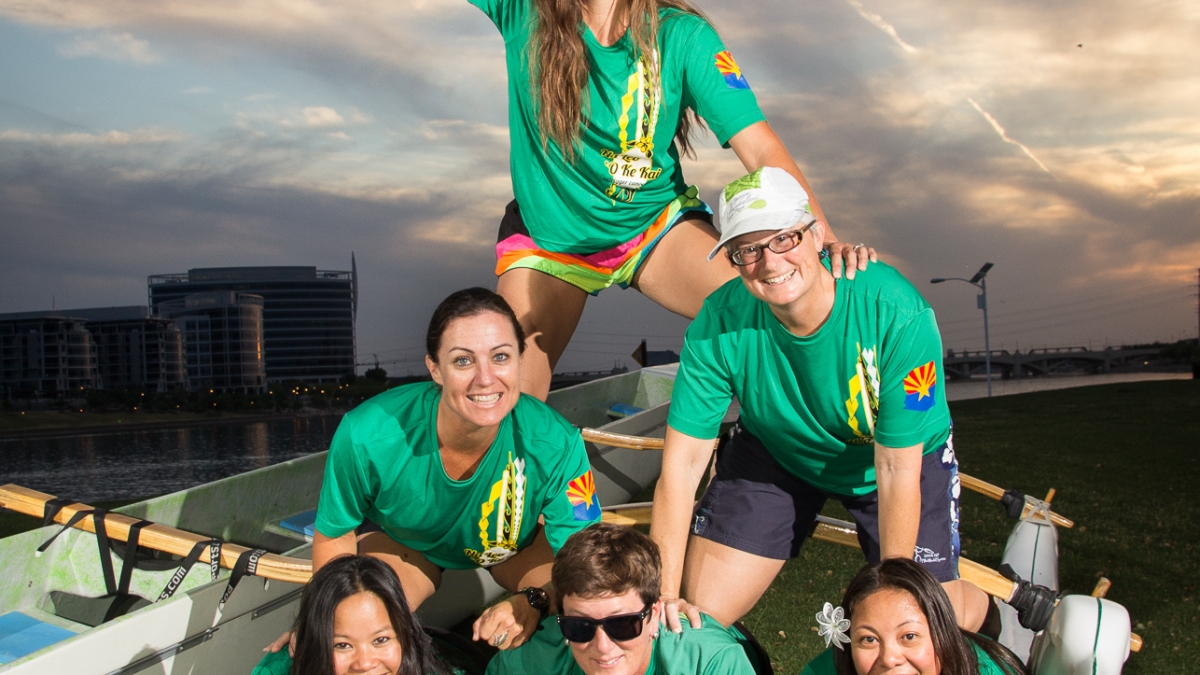ASU alumni, staff win silver in international outrigger competition

Two Arizona State University alumni and a staff member, part of a seven-member Arizona team, brought home a silver medal in the International Va'a Federation Outrigger World Sprint Championships in Rio de Janeiro, Brazil, in August.
The Arizona racers are members of Na Leo O Ke Kai (Voices of the Sea), the largest competitive outrigger canoe club in the state. The first team ever to represent Arizona in the worldwide competition two years ago in Calgary, Canada, this year in Brazil, they also became the first Arizona team to win a medal.
Team members are Margaret (Peggy) Coulombe, director of executive communications in the provost’s office; Anne Cook, who received her bachelor's and master’s degrees in social work from ASU; Marisalyn Singpradith, a graduate of the W. P. Carey School of Business; Alicia Lin-Kee; Teresa Mautino; and Andrea and Rich Gorrill.
Representing the U.S. in Brazil, the Arizona crew joined with paddlers from Northern and Southern California and the Pacific Northwest to compete collectively and individually in several classes of outrigger sprints. The V-12 sprint, where 12 paddlers propel two outrigger hulls lashed together, resulted in the silver medal.
Coulombe, who is the head coach of roughly 200 Arizona members, selected the elite team for international competition. Members of this elite group have trained together for about four years, participating in a race circuit hosted by the Southern California Outrigger Racing Association. The race season goes from March to September. Practice for the 2014 Brazil competition was intense over the course of eight months, with a minimum of four days a week paddling on Tempe Town Lake, often in triple-digit temperatures.
“It was a thrill representing Arizona and the team in a world sprint,” says Singpradith, who joined Na Leo O Ke Kai outrigger canoe four years ago after dragon boat racing at Tempe Town Lake. “We showed that despite having a desert landscape, we paddle as well as other teams that have the ocean for practice. I loved putting all my heart into it and working together with six people as one.”
“Our team connection is really amazing,” Cook says. “Peggy Coulombe always believed in us. She told us two years ago that we would race in the world championships in Brazil. We didn’t believe it could happen, but she made it happen.”
The va’a, or outrigger canoe, originated in Hawaii nearly 4,000 years ago, and a sailing version of the canoe was used to populate island chains throughout Polynesia. The modern sport has spread from Tahiti and Hawaii across the United States, Canada, South America, Europe and Asia. Nearly 2,000 athletes from around the world competed in Brazil this year, in Lagoa Rodrigo de Frietas, where Olympic rowing will be held in 2016.
Traditional canoes in Hawaii were made of the native tropical hardwood, koa. Modern racing canoes seat six, are roughly 40 feet in length and typically made of fiberglass, carbon fiber or other lightweight, man-made materials.
“Our club is very diverse, with members mostly of Asian Pacific Islander heritage,” Coulombe says. “Our club, more than any other in the state, offers more than elite competition and training, it provides a connection to Hawaiian culture, community and a sense of home.”
Two words in Hawaiian emphasize the traditional bonds that help unite the members. "Ohana" affirms the close ties and cooperation of family, including extended family. "Aloha" has multiple meanings in the Hawaiian language, including affection, peace, compassion and love.
“Weather conditions in Hawaii and Tahiti are ideal for paddling. Canoeing is basically a national sport there,” Coulombe says. “Here in Arizona, we are a small club with no facilities and little support, working out in conditions that most would find exceptionally difficult.” Yet the grueling training in the Arizona heat combined with positive Hawaiian values created a unique and winning team, she believes. “What our team has the most of is dedication and a lot of heart.”